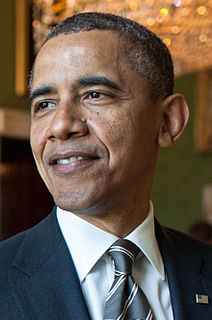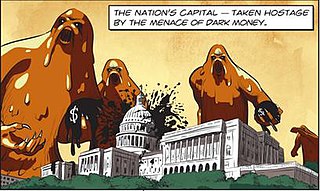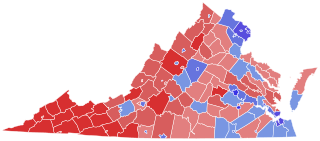The Green Party of the United States (GPUS) is a federation of Green state political parties in the United States. The party promotes green politics, specifically environmentalism; nonviolence; social justice; participatory democracy, grassroots democracy; anti-war; anti-racism, anti-capitalism, libertarian socialism and eco-socialism. On the political spectrum, the party is generally seen as left-wing.
Campaign finance laws in the United States have been a contentious political issue since the early days of the union. The Bipartisan Campaign Reform Act (BCRA) of 2002, also known as "McCain-Feingold", is the most recent major federal law affecting campaign finance, the key provisions of which prohibited unregulated contributions to national political parties and limited the use of corporate and union money to fund ads discussing political issues within 60 days of a general election or 30 days of a primary election, until BCRA's provisions limiting corporate and union expenditures for issue advertising were overturned in Federal Election Commission v. Wisconsin Right to Life.
In the United States, a political action committee (PAC) is a 527 organization that pools campaign contributions from members and donates those funds to campaigns for or against candidates, ballot initiatives, or legislation. The legal term PAC has been created in pursuit of campaign finance reform in the United States. This term is quite specific to all activities of campaign finance in the United States. Democracies of other countries use different terms for the units of campaign spending or spending on political competition. At the U.S. federal level, an organization becomes a PAC when it receives or spends more than $1,000 for the purpose of influencing a federal election, and registers with the Federal Election Commission (FEC), according to the Federal Election Campaign Act as amended by the Bipartisan Campaign Reform Act of 2002. At the state level, an organization becomes a PAC according to the state's election laws.

The Federal Election Commission (FEC) is an independent regulatory agency of the United States whose purpose is to enforce campaign finance law in United States federal elections. Created in 1974 through amendments to the Federal Election Campaign Act, the commission describes its duties as "to disclose campaign finance information, to enforce the provisions of the law such as the limits and prohibitions on contributions, and to oversee the public funding of Presidential elections."

The Bipartisan Campaign Reform Act of 2002 is a United States federal law that amended the Federal Election Campaign Act of 1971, which regulates the financing of political campaigns. Its chief sponsors were senators Russ Feingold (D-WI) and John McCain (R-AZ). The law became effective on 6 November 2002, and the new legal limits became effective on January 1, 2003.
A 527 organization or 527 group is a type of U.S. tax-exempt organization organized under Section 527 of the U.S. Internal Revenue Code. A 527 group is created primarily to influence the selection, nomination, election, appointment or defeat of candidates to federal, state or local public office.
The Hill committees are the common name for the political party committees that work to elect members of their own party to United States Congress. The four major committees are part of the Democratic and Republican parties and each work to help members of their party get elected to each chamber.
An independent expenditure, in elections in the United States, is a political campaign communication that expressly advocates for the election or defeat of a clearly identified candidate that is not made in cooperation, consultation or concert with; or at the request or suggestion of a candidate, candidate's authorized committee or political party. If a candidate, his/her agent, his/her authorized committee, his/her party, or an "agent" for one of these groups becomes "materially involved", the expenditure is not independent.
Campaign finance in the United States is the financing of electoral campaigns at the federal, state, and local levels. At the federal level, campaign finance law is enacted by Congress and enforced by the Federal Election Commission (FEC), an independent federal agency. Although most campaign spending is privately financed, public financing is available for qualifying candidates for President of the United States during both the primaries and the general election. Eligibility requirements must be fulfilled to qualify for a government subsidy, and those that do accept government funding are usually subject to spending limits on money.

The Pacific Green Party of Oregon (PGP) is a political party in the U.S. state of Oregon, recognized by the Oregon Secretary of State. It is affiliated with the Green Party of the United States. The party has occasionally elected candidates to public office at the local level.
In the 2008 United States presidential election, fundraising increased significantly compared to the levels achieved in previous presidential elections.

During the 2012 presidential primaries, 51 individuals sought the nomination of the Democratic Party. Incumbent President Barack Obama won the nomination unanimously at the 2012 Democratic National Convention and was re-elected as President in the general election by defeating Republican nominee Mitt Romney. As expected for the incumbent president, Obama won every primary election, but faced more difficulty than projected. Fifteen additional candidates appeared on primary ballots, and of these, four appeared on more than one ballot. Four qualified for convention delegates including: attorney John Wolfe, Jr., prison inmate Keith Russell Judd, perennial candidate Jim Rogers, and pro-life activist Randall Terry. Each of these had their delegates stripped prior to the convention due to technicalities.

In the politics of the United States, dark money refers to political spending by nonprofit organizations—for example, 501(c)(4) 501(c)(5) (unions) and 501(c)(6) groups—that are not required to disclose their donors. Such organizations can receive unlimited donations from corporations, individuals and unions. In this way, their donors can spend funds to influence elections, without voters knowing where the money came from. Dark money first entered politics with Buckley v. Valeo (1976) when the United States Supreme Court laid out Eight Magic Words that define the difference between electioneering and issue advocacy.

The 2020 United States Senate election in Virginia was held on November 3, 2020, to elect a member of the United States Senate to represent the Commonwealth of Virginia, concurrently with the 2020 U.S. presidential election, as well as other elections to the United States Senate in other states and elections to the United States House of Representatives and various state and local elections. Incumbent Democratic Senator Mark Warner won reelection to a third term against Republican nominee Daniel Gade.

The 2020 United States Senate election in Louisiana was held on November 3, 2020, to elect a member of the United States Senate to represent the State of Louisiana, concurrently with the 2020 U.S. presidential election, as well as other elections to the United States Senate, elections to the United States House of Representatives and various state and local elections. A blanket primary was held on November 3, 2020; if no candidate had won a majority of the vote in the blanket primary, then a runoff election would have been held on December 5.

The 2020 United States Senate election in Oregon was held on November 3, 2020, to elect a member of the United States Senate to represent the State of Oregon, concurrently with the 2020 U.S. presidential election, as well as other elections to the United States Senate, elections to the United States House of Representatives and various state and local elections. Incumbent Democratic senator Jeff Merkley won reelection to a third term in office. Although this Senate seat was largely expected to be one of the safest for the Democrats, the race received national attention due to the Republican nominee Jo Rae Perkins's promotion of the unfounded QAnon conspiracy theory.
Colorado Republican Federal Campaign Committee v. FEC, 518 U.S. 604 (1996), was a case heard by the Supreme Court of the United States in which the Colorado Republican Party challenged the Federal Election Commission (FEC) as to whether the "Party Expenditure Provision" of the Federal Election Campaign Act of 1971 (FECA) violated the First Amendment right to free speech. This provision put a limit on the amount of money a national party could spend on a congressional candidate's campaign. The FEC argued that the Committee violated this provision when purchasing a radio advertisement that attacked the likely candidate of the Colorado Democratic Party. The court held that since the expenditures by the Committee were made independently from a specific candidate, they did not violate the campaign contribution limitations established by the FECA, and were protected under the First Amendment.

FEC v. National Conservative PAC, 470 U.S. 480 (1985), was a decision by the Supreme Court of the United States striking down expenditure prohibitions of the Federal Election Campaign Act of 1971 (FECA), which regulates the fundraising and spending in political campaigns. The FECA is the primary law that places regulations on campaign financing by limiting the amount that may be contributed. The Act established that no independent political action committee may contribute more than $1,000 to any given presidential candidate in support of a campaign.

The 2020 Green Party presidential primaries were a series of primary elections, caucuses and state conventions in which voters elected delegates to represent a candidate for the Green Party's nominee for President of the United States at the 2020 Green National Convention. The primaries, were held in numerous U.S. states on various dates from early spring into early summer of 2020, and featured elections publicly funded, concurrent with the Democratic Party and Republican Party primaries, and elections privately funded by the Green Party, held non-concurrently with the major party primaries.

Shadow campaigns refers to spending meant to influence political outcomes where the source of the money is not publicly disclosed or is difficult to trace. United States campaign finance law has been regulated by the Federal Election Commission since its creation in the wake of the Watergate Scandal in 1975, and in the years following Citizens United v. FEC, there has been a rise in outside special interest groups spending money on political campaigns in the United States. Dark money leaves voters uninformed about important political information and it can obscure potential conflicts of interest for judges and legislators alike.










